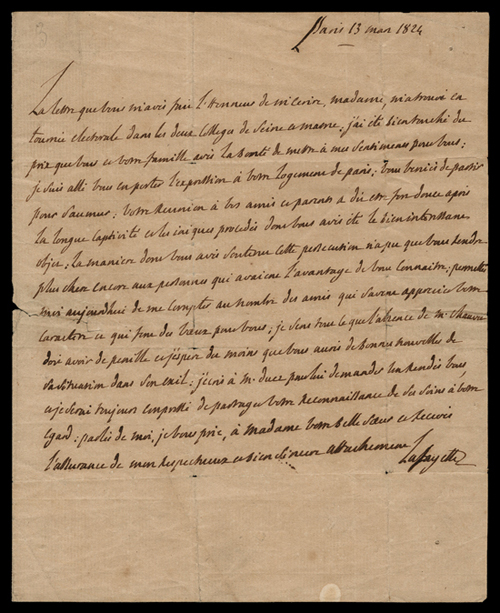
Auction: 313 - Numismatic Collector's Series - Ft. Worth, TX
Lot: 1468
Lafayette, Marie-Joseph Gilbert du Motier, Marquis de French soldier and patriot (1757-1834); volunteered to assist in the American Revolution and was given a general´s commission (without pay), but due to his youth, he began as an aide to General Washington, who became his mentor; after proving himself in battle, he received his own command; present at the British surrender at Yorktown; involved also in the French Revolution, where he became the voice of the moderates, but was ultimately imprisoned by royalists; freed after a few years, he remained a voice of reason and freedom in France, returning to the United States for a hero´s welcome in 1824. Intriguing and possibly important Autograph Letter Signed "Lafayette," 1 page, small 4to, Paris, March 13, 1824. He writes to Madame Chauvet, at whose trial for treason he had been called as a witness a month earlier. The woman´s husband had been convicted and sentenced to death as part of a failed plot to foment a popular rebellion against the restored Bourbons in Saumur in 1822. He had fled to England, and in early 1824, his wife returned from a visit to him bearing letters from him and other exiles for various friends in France. The letter to Lafayette said only that Madame Chauvet would communicate the message to him in person. The letters were discovered, and though the administration hoped to initiate charges of treason against Lafayette, they had to settle for calling him to testify. When the court addressed the popular hero as the Marquis de Lafayette, he famously objected that he had renounced his noble title in the Revolution and would not answer to it. His testimony gave no help to the prosecution, and Madame Chauvet was acquitted. Lafayette pens, "Your letter found me in an electoral campaign in the Seine-et-Marne department [where he was a member of the Chamber of Deputies]. I was very touched by how much you valued my support...Your reuinion with your friends and family must have been heartwarming after your long imprisonment and the gross injustice you were the object of. The manner in which you held yourself under this persecution could only have made you more precious to those that know you...I understand how difficult the absence of Mr. Chauvet must be and hope that you at least have news of his situation in exile. I am writing to Mr. [Duer?] to ask him for a meeting and I am anxious to tell him of your recognition of his work on your behalf..." Toned, a few small closed tears, fold wear including tiny holes at some junctions, but VG. In just a few months, Lafayette would begin his triumphant final visit to the United States. If his mention here is indeed of a Mr. Duer, it was no doubt one of the two prominent jurists who were sons of his late American friend William Duer, who may have sought to offer asylum to the Chauvets. A most interesting letter, worthy of further research.
Sold for
$900




